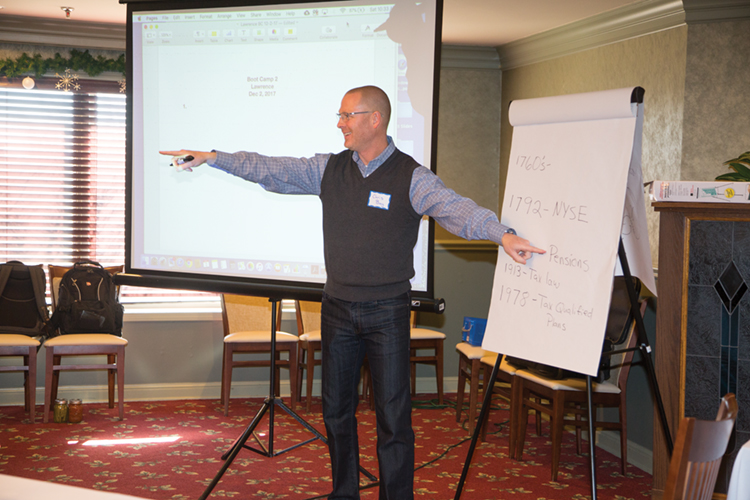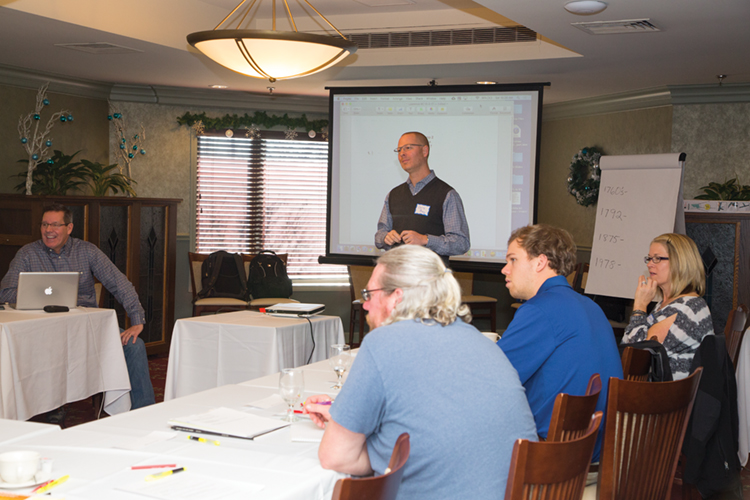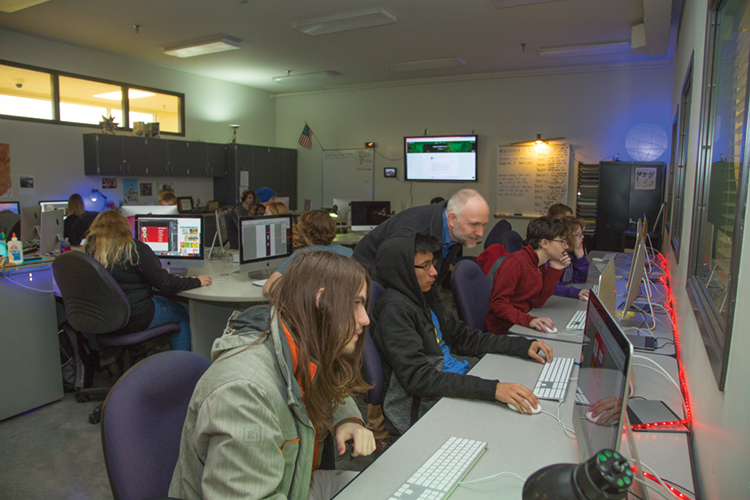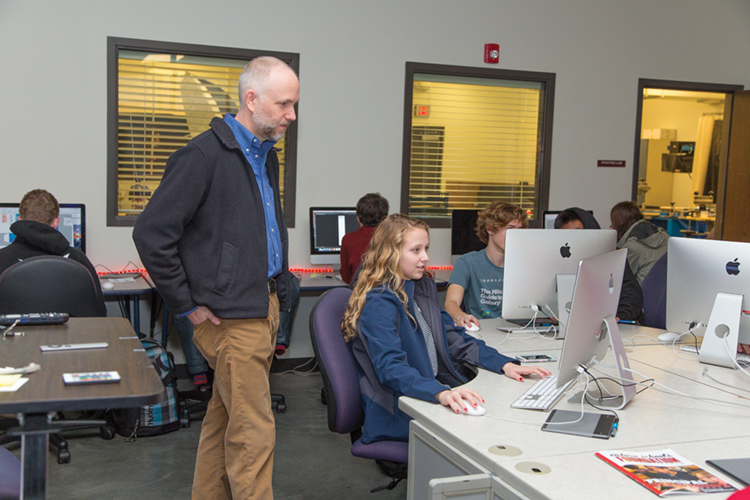Education Careers Before and After
| 2017 Q4 | story by Bob Luder, photos by Steven Hertzog
-George Eliot, Leading writer of the Victorian era

Chris Bay, an infinite banking coach with Life Success Legacy conducts a “boot camp” seminar for his clients at the Lawrence Country Club.
Education has always been considered a noble pursuit. Nelson Mandela called it, “the most powerful weapon which you can use to change the world.”
By extension, being an educator can be among the noblest of professions. Noah Musser is an educator after spending a decade at the beginning of his professional life as a journalist. Chris Bay started in education and was a well-known principal in Lawrence for more than a decade before changing gears and going into financial planning.
One moved toward teaching and education, one moved away from it. But, both Lawrence residents insist they always have been educators and always will be. Just because they work or have worked in professions outside the parameters of a school district doesn’t make it untrue.
“The best thing [about changing professions]was learning things about myself, how I’m wired,” Bay says. “And, I learned I love to teach. We [Bay and his partners] are an educational institution. We just get paid by a life insurance commission.”
Musser says, “When I was a journalist, I understood I was educating people. I never got to see if it stuck, but I was getting the truth out there. In school … you get to see if they get it.”
It was Musser’s legacy that he go into journalism. His father, Rick Musser, was a longtime journalism professor at the University of Kansas (KU). So, it only came naturally that Musser immersed himself in visual communications and journalism, spending 11 years at major metropolitan dailies in the Twin Cities in Minnesota and Kansas City, Missouri. But, when staff cuts and layoffs began to become the norm in that industry, Musser decided he didn’t want to wait to be the last man standing and moved toward a more stable career: teaching.
Bay also took a rather unconventional route to spending 13 years as principal of one of the top elementary schools in the city. But, when he found his job was leaving him with little energy for his own family, he decided it was time to step away and try something else. A series of chance meetings and associations led him to becoming an infinite banking coach.
– Kofi Annan, secretary-general of the United Nations, 1997-2006
“Changing careers seems impossible when you first contemplate it; but it’s totally possible,” Musser says. “If you embrace it, it’s definitely doable.
“You should never be afraid to reinvent yourself,” he continues.

Chris Bay conducting a “boot camp” seminar for his clients.
“It never feels like work.”
Growing up as a teenager in Overland Park, Kansas, young Chris Bay entertained thoughts of being the next Frank Lloyd Wright more than the next great educator. After graduating from Shawnee Mission East High School, he enrolled at KU and pursued an education in architecture. He was three years into the five-year program when a summer job led to an epiphany.
“The summer between my junior and senior years, I was a summer counselor at Camp Kanakuk, near Branson [Missouri],” he says. “I found that I really enjoyed developing relationships with the young men there and investing in them.
“I’m very much a purpose-driven person,” he continues. “I didn’t have a clear picture of how I was going to change peoples’ lives in architecture.”
Bay transferred to Baker University, in Baldwin City, with the purpose of one day teaching in urban settings. Within two years, he earned his Bachelor of Science in education and quickly landed his first teaching job at Kennedy Elementary, in Lawrence. After three years there, he moved on to Grant Elementary, where he spent six years while beginning work on a master’s degree in education administration.
That’s when he was approached by a fellow teacher who mentioned an opening for a principal at Sunset Hill, an elementary school in Lawrence that, at the time, was in a state of disrepair.
“I remember asking her, ‘I’m 30 years old, no experience. Why would I apply for that job?’ ” Bay says. “For some reason, I did, and I got the job.”
Bay spent the next 13 years helping build Sunset Hill into one of the most highly regarded elementary schools in Lawrence, though he’s quick to point out he didn’t do so himself.
“It was at least five years until trusting relationships were formed,” he says. “I had a fantastic staff. As a team, we built Sunset to where people felt it was home.
“I’m very proud of my 13 years in that community,” he continues. “By the end of my time there, we had a list of people wanting to transfer there.”
Ah yes, the end. Bay thought at the time that he would spend the remainder of his working life in education. He’d been approached about other positions within the school district, but it had never felt right to leave.
During his tenure, Sunset started what was known as the Watchdogs, a program where fathers of students came to the school and volunteered service and leadership. It was that program that inevitably led to Bay’s departure from Sunset and the education industry.
“I developed relationships with a couple of the dads,” he says. “One day, I asked one how he managed personal business affairs. He brought up the infinite banking concept. I had already been doing [financial guru]Dave Ramsey’s plan for about seven years.”
Even on the Ramsay plan, Bay found there wasn’t enough disposable income to set aside for family vacations. He, his wife, Shawn, and their two daughters weren’t able to go out for dinner often.
And, while he loved his work at Sunset Hill, he says he found he had little energy left for his family when he got home in the evenings.
“That carrot was so far out on the horizon, it was really depressing,” he says.
He let the infinite banking concept sit for about two months until he asked another Watchdog parent about it and received the same answer. It worked. In the meantime, he read a book, “Becoming Your Own Banker,” by Nelson Nash. Another Watchdog parent recommended Bay connect with Mike Everett, a leading proponent of the concept who would become his business partner.
“Nine months later, I started IBC [Infinite Banking Concept],” Bay says. “Twenty-six months later, I paid off our home.
“This concept will change peoples’ lives. My daughters will never have to borrow a dollar from an institution,” he says.
Bay reluctantly resigned as principal at Sunset Hill after winter break in 2013 and has been holding seminars teaching the infinite banking concept for the last five years. He says he concentrates the bulk of his work over 2½ days during the week—Tuesdays, Wednesdays and Saturday mornings. A couple days are for preparations and behind-the-scenes work, and he leaves Fridays and Sundays free to spend time with his family.
“Friday mornings, my wife and I do dates,” he says. “We never got to do that before.”
Switching from a steady paycheck to an income that’s commission-based has taken some adjustment, he says. He and his family have had to learn how to budget. But …
“I love my work,” he says. “My office is in my house. I wish I would’ve known about this concept sooner.
“I would really recommend to anyone to spend time with the tools to help you do what you really want to do,” Bay explains. “Then, it never feels like work.”

Noah Musser teaches his graphic design students at Eudora High School.
“Don’t be afraid to reinvent yourself.”
Following the lead of his prominent journalism professor father, Noah Musser earned his Bachelor of Fine Arts in visual communications from KU in 1997. He moved to the snow belt for his first job as a graphic artist at the St. Paul Pioneer Press, in St. Paul, Minnesota, and a year later moved next door in the same position at the Star Tribune, in Minneapolis. After spending a year at the Universal Press Syndicate as a digital imaging specialist, he was able to move his family back to his hometown when he caught on at The Kansas City Star.
“I was basically a graphics reporter,” he says. “I was explaining stories to readers through graphic images. I loved what I did.”
Six years later, however, at the same time the U.S. economy was taking a sharp downturn, the burgeoning internet began changing the way people received news and information, and made life difficult for the print-news industry. Newspapers throughout the country, including The Star, began cutting staff to survive financially.
“Once people started getting laid off, I told myself I didn’t want to be the last person there,” Musser says.
While working at The Star, Musser moonlighted as an adjunct instructor at KU, teaching upper-level print and online design courses from 2002 to 2004. Once he left The Star, he decided the time was right to seek a graduate degree. After earning a master’s degree in math and a secondary math teaching license, he began student teaching in Eudora and also was a teaching assistant at KU, teaching multiple sections of college algebra.
Then, in 2011, in what almost seemed like kismet, a position opened at the Eudora-DeSoto Technical Education Center that suited Musser’s background perfectly. The school needed a teacher for its graphic design department.
“They were looking for someone who could work in Photoshop and tech design,” he says. “I had other offers to teach math, but I loved the art side of it. Students were curious about it. They were not wanting it to be over.”
Every year, Musser added classes to his workload. He took on photo journalism and became faculty advisor for the student newspaper.
“I have eight preps a day,” he says of the number of different setups he has for classes each and every day. “I get up at 5:15 every morning just to make the big push to get ready for every day. I’m not sure how I do it. If I ever left, they’d have to hire two people to do it.”
Musser learned from his days in journalism to not go into anything with preconceived notions, because when you get there, things will likely have changed. All he strives for, he says, is instilling in his students a sense of truth.
“I’m in year No. 6 now,” he says. “It’s been great.”
And, Musser has been great at his job, as documented by the awards he’s received. This year, he was named USD 491 Secondary Teacher of the Year. In 2014, he received a Kansas Cable Telecommunications Horizon Award and was awarded designation of “Honors” by the University of Kansas Master’s Degree committee. And, that’s just for his teaching and education honors. His journalism awards are too numerous to mention.

Noah Musser teaches his graphic design students at Eudora High School.
“I miss the way [journalism]was,” he says. “But, I know what we had years ago is gone. I miss the old days, but that doesn’t exist anymore. I’m definitely happier now.”
Like Bay, whom he has never met, Musser’s family is better off as well since switching careers. His two children, five and one in age at the time he switched careers, are now 12 and nine. He was able to spend more time caring for them when he was going back to school and now has his summers off, freeing up more family time.
Society can’t function without a good public-education system, so he says he feels he’s making a positive contribution in that regard.
“It’s forced me to put my own view of myself into perspective,” Musser says. “Now, I get to see a cross-section of society. I learned a lot about myself that way.
“There may be a time, when the kids get in college, when I need to earn more,” he says. “But, yeah, for now, I really love what I do and see myself doing it for awhile.”

83 Comments
nerisone cr̬me sans ordonnance: Pharmacie Express Рpeut on acheter une seringue avec aiguille en pharmacie sans ordonnance
soldesam 8 mg en gocce prezzo farmacia veterinaria online san marino
traitement prГ©ventif paludisme prix: cystite antibiotique sans ordonnance – slim ventre plat
comprar amoxicilina sin receta en espaГ±a: tecnico auxiliar de farmacia y parafarmacia online – terbinafina farmacia online
tu farmacia en casa online: farmacia gil online – farmacia online barata canarias
http://pharmacieexpress.com/# fungizone prix sans ordonnance
zolpeduar 5 mg zhekort spray nasale prezzo plenvu costo
viagra generique 50 mg: commander tadalafil sans ordonnance – tramadol sans ordonnance
colchimax sans ordonnance: d̩riv̩ amoxicilline sans ordonnance Рm̩dicament angine sans ordonnance
pillola naomi confezione Farmacia Subito dexamono collirio prezzo
deltacortene 25 prezzo: dottor max farmacia – farmacia veterinaria online spedizione gratuita
prueba rapida vih farmacia online: comprar pastilla del dia despues sin receta espaГ±a – laurea farmacia online
pilule optilova sans ordonnance en pharmacie spedra 200 rage de dent medicament sans ordonnance
https://pharmacieexpress.com/# gel Г©rection en pharmacie sans ordonnance
farmacia top online: prazene 10 mg dove comprarlo – farmacia via curie
fluaton collirio monodose: Farmacia Subito – clody 200 generico prezzo
farmacia jerez online Confia Pharma cupon la farmacia online
tadalafil 20 mg 8 compresse prezzo: perfalgan principio attivo – endodien prezzo
viagra online france: lycopodium clavatum 15ch effets secondaires – tadalafil arrow sans ordonnance
la isotretinoГna se puede comprar sin receta en farmacias no en linea farmacia online genova farmacia homeopatica online espaГ±a
medicament sans ordonnance cystite: lachesis 9ch – mГ©dicament liste 2 sans ordonnance
http://pharmacieexpress.com/# quel est le meilleur antidГ©presseur sans ordonnance
comprar orfidal sin receta online Confia Pharma donde comprar viagra sin receta en madrid
puedo comprar clindamicina sin receta: farmacia espana online – se puede comprar viagra en farmacias sin receta
mexican pharmacy online: thailand pharmacy viagra – provigil uk pharmacy
https://pharmmex.com/# legit canadian pharmacy
farmacia mexico online farmacia pharmacy mexico mounjaro mexico cost
india medicine: india pharmacies – reliable pharmacy india
online pharmacy app developer in india: medicines online india – indian online pharmacy
http://pharmexpress24.com/# tom thumb pharmacy
buy medications online: online shop pharmacy – is mounjaro mexico pharmacy legit
buy viagra boots pharmacy online pharmacy prednisone nexium 40 mg pharmacy
online pharmacy in india: pharmacy names in india – best online pharmacy india
wegmans pharmacy free atorvastatin: indian pharmacy paypal – real pharmacy rx generic viagra
mexican phentermine vs american: Pharm Mex – pharmacy in mexico that ships to us
aster pharmacy india buy medicine online medicine online india
https://pharmexpress24.com/# publix pharmacy store hours
buy online medicine: buy medicines online – best pharmacy in india
viagra prices pharmacy: Pharm Express 24 – meijers pharmacy
mexican pharmacy prices review mexican pharmacies near me rx medication store
online medicine india: online medicine order – ex officio member of pharmacy council of india
pharmacy names in india: InPharm24 – ivermectin india pharmacy
prescriptions in mexico: mexican antibiotics – affordable medications
what to buy mexican pharmacy online drugstore mexican city pharmacy
https://inpharm24.shop/# india online pharmacy
when will mounjaro be in mexico: Pharm Mex – can you buy antibiotics in mexico
best online mexican pharmacy: what drugs can you get at a mexican pharmacy – safe mexican pharmacy
ondansetron online pharmacy: Pharm Express 24 – the pharmacy store apopka fl
buy medicines online in india ozempic india pharmacy india mart pharmacy
pharmacy council of india: best online pharmacy in india – divya pharmacy india
pharmacies online: online vet pharmacy – pharmacy store window
clomid online pharmacy online pharmacy ambien no prescription zovirax cream pharmacy
usa pharmacy online: Pharm Express 24 – pharmacy store viagra + cialis
https://inpharm24.com/# pharmacies in india
when first pharmacy course was started in india: online india pharmacy – drugs from india
mexican pharmacy that delivers to usa Pharm Mex order from mexico
mexican pharmacy list: reputable online canadian pharmacy – viagra mexican pharmacy
sainsburys pharmacy viagra: rx plus pharmacy – Enalapril
retail pharmacy market in india pharmacy council of india meds from india
medlife pharmacy: online india pharmacy reviews – india online pharmacy
mexican pharmacy cialis: buying medicine in mexico – us pharmacy online shop
https://pharmexpress24.shop/# mexico online pharmacy reviews
ordering prescription drugs online mexican pharmacy los angeles buy ozempic mexico online
lipitor pharmacy: Pharm Express 24 – online pharmacy spironolactone
apotheke academy reliable pharmacy india online medicine india
how much is viagra in mexico: Pharm Mex – can you buy ritalin in mexico
medicine online india: india online pharmacy – pharmacy store in india
mexican amoxicillin farmapram purchased at mexican pharmacy can it be laced tirzepatide mexico pharmacy
https://pharmmex.shop/# clenbuterol mexico pharmacy
best pharmacy franchise in india: aster pharmacy india – india online pharmacy international shipping
viagra 200mg tablets VGR Sources cheap generic viagra
sildenafil 20 mg without a prescription: buy viagra without a prescription – viagra comparison
https://vgrsources.com/# viagra medicine
sildenafil 100mg price in india: generic sildenafil buy – how to buy viagra in india
viagra pills viagra 100mg tablet online sildenafil mexico pharmacy
buy viagra best price: VGR Sources – viagra in mexico cost
where can i buy viagra for women: paypal viagra australia – sildenafil 50mg uk
https://vgrsources.com/# sildenafil generic canada
female viagra online uk VGR Sources viagra price in india online
buying viagra without prescription: how to get sildenafil online – viagra medication online
viagra gel caps: VGR Sources – order viagra europe
purchase genuine viagra generic viagra soft tabs where to get viagra no prescription
viagra price online: VGR Sources – viagra compare prices